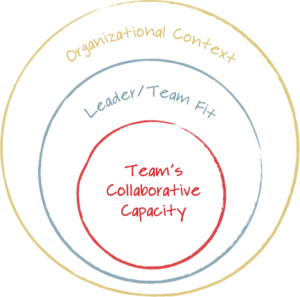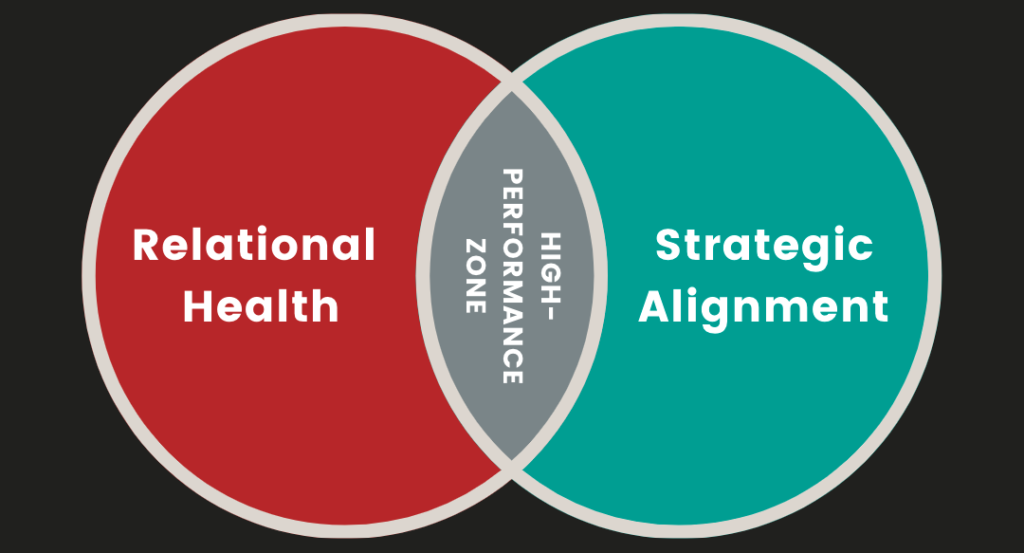RADICAL, CONSCIOUS COLLABORATION FOR HIGH-PERFORMING TEAMS
Great teams are built, not born.

Alone we can do so little. Together, we can do so much.
Unknown
We coach your entire team system, enabling significant shifts for individuals and the team in key collaborative behaviors and attitudes that support team effectiveness.
Individual leadership coaching has been used in organizations as a way to either support star performers or to deal with remedial issues. But both of these approaches focus on just one person being the “hero” or the “villain” on a team receiving the coaching.
Team coaching is more than just coaching individual team members. By coaching the entire team, we recognize that collaboration is a collective, integrated effort.
Consequently, team development is most effective when the coaching client is the entire team itself.
What it takes to build highly collaborative teamsCONSCIOUS COLLABORATION
Collaboration rarely just happens. It usually requires on-going, intentional effort to nourish the right skills and attitudes, a commitment to discuss needs, and a willingness to navigate disagreements with curiosity, courage, honesty, and care. Engaging in this sort of intentional collaborative capacity building can feel radical – but it’s exactly this collective process that makes a team great. We call it conscious collaboration.

Teams are at their best when they are both relationally healthy and strategically aligned.
Relational Health
Getting the “task-side of collaboration” right – establishing clear roles and decision norms, defined priorities and goals, clear accountability – is an essential step for teams to achieve solid team performance. It’s no small feat to do this well.
But it takes more – and something else – to reach and maintain high levels of flow, motivation, and collective problem-solving: A team needs to get the relational side of collaboration right. That’s a much tougher challenge for many teams, as it requires building camaraderie, emotional maturity and a culture of “psychological safety” where team members can productively challenge each other and take creative risks without fear of judgment or embarrassment.
Lack of relational health between team members can lead to feigned commitment, siloed thinking, or the omission of relevant concerns, doubts – or even breakthrough ideas – making it harder for a team to align strategically.
Strategic Alignment
Producing a clear and credible strategy or strategic plan is a key responsibility of a leadership team and a challenging process in and of itself. While most organizations we work with have some strategy or strategic plan, we rarely find that all team members are able to succinctly state what it is, what it means, and which priorities and boundaries follow. Rather, small misalignments or ambiguities make subsequent decision-making inefficient or unnecessarily tense.
Improving the strategic alignment of a leadership team touches multiple relational, strategic, and tactical questions. Tracking all this is a complex job and often benefits from facilitation. (Learn more about how we support this process.)
Lack of strategic alignment often negatively impacts relational health on a team because these misalignments compound existing differences and show up as personal conflict.
We support radical collaboration by building attitudes and skills essential for high-performing teams:
- We help each individual on the team (through self-reporting, stakeholder interviews, and 360 reviews) to identify their next developmental “edge” for growth and then we coach the individual with those few critical goals in mind
- By working with different team members and the team as whole, we continually get a wealth of current, relevant, real-life data that powerfully supports individual coaching processes
- Using select personality / work style instruments (e.g. MBTI, Hogan Inventory, Leadership Circle Profile, FIRO-B, Enneagram) we facilitate meaningful conversations about balancing work style preferences, understanding triggers enabling team members to function from creativity and not reactivity
- You can’t have accountability without well-defined goals, and you cannot have goals without defined priorities – which in turn need a defined and shared sense of vision and purpose
- Little misalignments add up and lead to inefficiencies in decision-making and implementation. We facilitate a properly sequenced process – so your team can have a structured space to focus on the conversations it needs to have
Learn more about our strategic alignment workshops with teams.
- By coaching individuals, we better understand the nuances of relationships on the team which strengthens our ability to align relational and strategic issues, deepen trust, and build the team’s collaborative practices
- When we work with the entire team, we experience individual leaders in their real-time work contexts – and we can feed back these direct impressions into the one-on-one coaching process
- Unresolved interpersonal conflict will almost always dominate team dynamics. When needed, we conduct mediated conversations between individual team members where the relationship is stuck and in need of a third-party for additional support
- Tailored skill-building sessions support critical skills needed on the team
- Bringing all these activities together into one integrated approach is the core of systemic team coaching